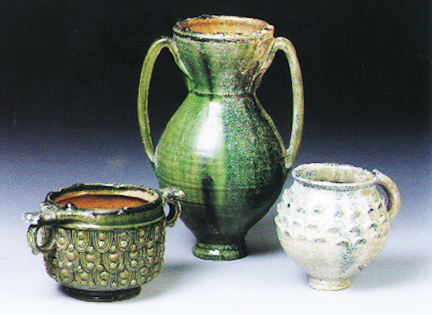One type of Roman pottery was made using a lead glaze. Originating earlier in Egypt and Mesopotamia, this technique came to be used by the Romans. Glazed pottery does have a greater water retention, and certainly a wider range of possible colors than polychrome slip painted ware, but presents new problems for the potter. First among these problems is that ware could not be stacked in the kiln atop each other. Glazed pots must be loaded into the kiln so that they do not touch, or during the firing process, the glazes will melt together, and ruin the pieces as they stick to each other. Another problem is that glazes may run during the firing, adhering the work to the kiln supports, again ruining the work. Lead is also a highly poisonous material for the potter to work with, and the use of lead in glazes certainly cause potter's life spans to decrease, not to mention the users of the potter. Perhaps it was not an issue at a time when the Romans put lead in their wines to improve the taste, and life spans were commonly short anyway. . .
These three examples are from the Roman provinces: at left is a two handled cup with sprigged scales from Gaul (southern France), in the middle a vase with two handles from Tharros, and at right, a single handled cup with a leaf design from Asia Minor. After the fall of the Roman empire, much of their ceramic technology was lost, but the use of lead in glaze continued in Byzantium. The Romans pioneered the use of production methods such as sprigging and the use of molds to automate the process of ceramic making. Sprigging involves using a small mold to press clay into, to get decorative elements that can be joined to the surfaces of pottery, such as the small cup at right, which has scales made using such a sprig mold. Modern, mass produced pottery is made using sprigs and molds, and can trace its history back to the Romans, for better or worse.

Glazed Vessels, from the Roman Provinces
20-70 CE


